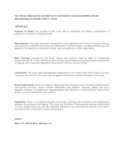THE TIPPING CONSEQUENCE ON HOSPITALITY’S RESTAURANT FOOD AND BEVERAGE SERVICE RESPONSIVENESS IN KISUMU COUNTY – KENYA
Abstract
Purpose of study: The purpose of this study was to investigate the tipping consequence of restaurant food service responsiveness.
Methodology: The study employed a descriptive survey approach within Kisumu County in Kenya, with a focus on classified hotel restaurant (dependent). A simple random sampling methodology was applied in the selection of restaurant clients, with a sample size of 384 respondents.
Main Findings: According to the study, tipping was found to have an effect on foodservice responsiveness (P ˂ 0.05), and thus a clear indication that foodservice responsiveness is dependent on tipping within classified dependent restaurants in Kisumu County, Kenya.
Limitations: The study captured dependent restaurants in star-rated hotels within Kisumu County. Therefore, the results of the study may be applied with caution outside the scope of the study.
Social Implications: Since its inception, tipping has been thought of as an incentive towards quality food service provision, hence customer satisfaction and retention. However, tipping has had a negative influence on foodservice responsiveness and therefore a compromise on food service quality, customer satisfaction and retention.
Originality: There is insufficient literature on the topic, although with a handful on the relationship between service quality and tipping. This study will, therefore, fill the gap and used as a benchmark for other studies within not only the hospitality industry but the entire service industry. As a result, the study will be utilized both in policy and practice.
URI
https://doi.org/10.18510/ijthr.2020.712https://giapjournals.com/ijthr/article/view/ijthr.2020.712
http://r-library.mmust.ac.ke/123456789/1535
Collections
- Gold Collection [990]

